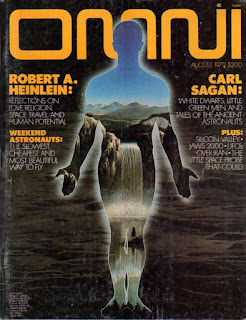Martin, George R.R. "Sandkings." Omni, August 1979.
This article is part of my attempt to read all the 155 stories currently (as of 1 November 2022) on the ISFdb's Top Short Fiction list. Please see the introduction and list of stories here. I am encouraging readers to rate the stories and books they have read on the ISFdb.
ISFdb Rating: 8.88/10
My Rating: 9/10
"Simon Kress lived alone in a sprawling manor house among dry, rocky hills fifty kilometers from the city."
Wealthy and arrogant Simon Kress likes to amuse himself with unusual pets, and needs a new kind of somewhat self-sufficient pet as he is often away from home for lengthy periods. At an obscure rarities shop, he purchases psionic insect-like creatures called "sandkings." These creatures have a "maw" that lives underground and is protected by its minion "mobiles," who built elaborate castle-like structures over their maw. Moreover, these creatures can wage war among their groups, and worship their owner who feeds them, to the point that they can carve the owner's likeness into their castle.
Kress purchases four maws and a large aquarium-encased desert is installed in his house. Seller Jala Wo tells him to be patient, that the creatures need time to evolve and develop their communities before the warring and worshipping can begin. Yet Kress is nothing but impatient. Utterly spoiled by wealth and the social circle in which he revolves, Kress learns to provoke the sandkings into battle through calculated starvation, and soon places the creatures on display for his impressed elite guests. Betting ensues, and things get pretty nutty. As we expect, everything escalates, from the growth of the sandkings to their abuse, their battles, the social gatherings and even the skewed worshipping of Kress.
The story straddles many genres, from science fiction with elements of fantasy, it soon evolves into pure horror with even quite the all-out action sequence in its latter stages. The story is satire and a cruel depiction of wealth and greed--its protagonist is not one who will change but instead become more and more warped as his situation becomes more dire, and he shows absolutely no compassion, or even the slightest acknowledgement of those he harms along the way, committing acts to protect himself that can pretty much harm anyone and everyone who get involved. The violence too escalates as does the gruesome horror. It is all done well though, as the novella-length allows for good pacing and story development. Unlike Kress, the narrative is very patient, giving the reader first Kress's current situation and circumstance, nicely bringing in the sandkings and developing those creatures at a nice pace as well. Martin then begins to toss everything into the story, placing Kress through various stages of horror and desperation, as he attempts so many ways in escaping his ever-evolving sandkings.
And that ending is excellent.
As much as we despise Kress, and pretty much everyone else in the story, we cannot help feel threatened by these creatures and hence drawn into Kress's own desperations as he attempts to leave the hell that he has created. We want Kress to get what he deserves, but we do not necessarily want the sandkings to be victorious. These creatures essentially evolve from Kress's own warped psychology, and the physical world that the sandkings begin to build around Kress are pretty much emulating his own warped mind, as though they are evolving as Kress himself had evolved, from opportunist to egoist to murderer.
This story left a strong impression on me when I first read it as a teen. Incidentally, in Nebula Winners 15 (Frank Herbert, ed., Harper & Row, 1981), which is where I also first encountered a couple other stories that impressed me, including Barry B. Longyear's "Enemy Mine." This is my third reading, I believe, and I have enjoyed it each time. The novella was loosely adapted for the pilot episode of The Outer Limits, and while much was changed to make the story more contemporaneous and appropriate for prime time, an to make Kress into a mad scientist rather than a greedy young professional, it is on its own merits enjoyable television, with a great performance by Beau Bridges.
For this week's Wednesday's short stories, please visit Patti Abbott's blog.















1 comment:
Martin generally better in shorter forms, I'd say...the first work of his that struck me as excessively self-indulgent was THE ARMAGEDDON RAG.
I rather enjoyed THE OUTER LIMITS revival pilot, as well.
Post a Comment